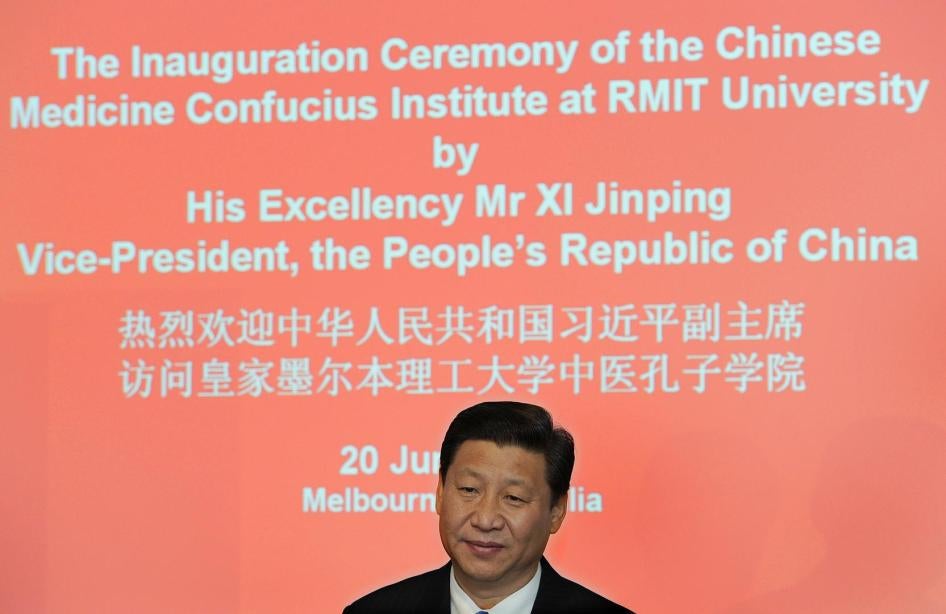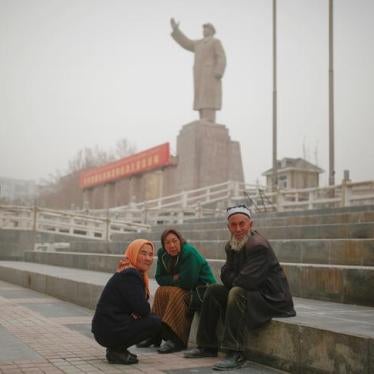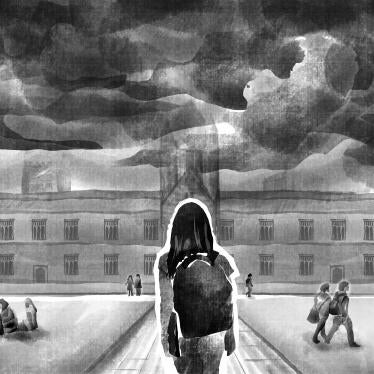(New York) – Institutions of higher learning around the world should resist the Chinese government’s efforts to undermine academic freedom abroad, Human Rights Watch said today. On March 21, 2019, Human Rights Watch published a 12-point Code of Conduct for colleges and universities to adopt to respond to Chinese government threats to the academic freedom of students, scholars, and educational institutions.
Many colleges and universities around the world with ties to the Chinese government, or with large student populations from China, are unprepared to address threats to academic freedom in a systematic way, Human Rights Watch said. Few have moved to protect academic freedom against longstanding problems, such as visa bans on scholars working on China or surveillance and self-censorship on their campuses.
“Colleges and universities that stand together are better equipped to resist Chinese government harassment and surveillance on campuses, visa denials, and pressures to censor or self-censor,” said Sophie Richardson, China director at Human Rights Watch. “Most important, they will be better prepared to ensure academic freedom on their campuses for all students and scholars, particularly those from China.”
The proposed Code of Conduct is based on more than 100 interviews between 2015 and 2018 in Australia, Canada, France, the United Kingdom, and the United States with academics, graduate and undergraduate students, and administrators, some of them from China. The people interviewed came from a range of institutions, including globally known universities, large public institutions, and small, private colleges. Almost all were from or study China, or have operated academic programs on behalf of their institutions in China.
Human Rights Watch found various threats to academic freedom resulting from Chinese government pressure. Chinese authorities have long monitored and conducted surveillance on students and academics from China and those studying China on campuses around the world. Chinese diplomats have also complained to university officials about hosting speakers – such as the Dalai Lama – whom the Chinese government considers “sensitive.”
Academics told Human Rights Watch that students from China have described threats to their families in China in response to what those students had said in the classroom. Scholars from China detailed being directly threatened outside the country by Chinese officials to refrain from criticizing the Chinese government in classroom lectures or other talks. Others described students from China remaining silent in their classrooms, fearful that their speech was being monitored and reported to Chinese authorities by other students from China. One student from China at a university in the United States summed up his concerns about classroom surveillance, noting: “This isn’t a free space.”
Many of the academics interviewed identified censorship and self-censorship as serious concerns. One said a senior administrator has asked them “as a personal favor” to decline media requests during a visit by Chinese President Xi Jinping, fearing that it could have ramifications for their university.
At two US universities, senior administrators cancelled appearances by speakers they believed the Chinese government would deem “sensitive,” and in one of those cases, the dean explained to a faculty member that the school did not want to lose its growing number of students from China. In another case, colleagues discouraged a scholar at a university with a large population of students from China from assigning his classes potentially “sensitive” titles. Two described academics participating in hiring panels in which the candidates were questioned during job interviews about their views on Confucius Institutes, which are effectively international outposts of China’s Ministry of Education that offer classes in Chinese language and culture.
Many of those interviewed said they modified their remarks inside and outside classrooms because of fears of being denied access to China or to funding sources, of causing problems for students or scholars from China or their family members, or of offending or irking students or scholars from China.
Many expressed discomfort with the presence of Confucius Institutes on their campuses. They said the presence of such institutions fundamentally compromised their institution’s commitment to academic freedom, especially when Confucius Institutes had been invited to their campuses without broad faculty consultation. In 2019, Victoria University cancelled the screening of a documentary critical of Confucius Institutes after the university’s Confucius Institute complained.
A number of US institutions, including the University of Chicago, North Carolina State University, and the University of Massachusetts Boston have closed or announced they will close the Confucius Institutes on their campuses because of concerns about academic freedom, among other reasons.
Few of those interviewed believed that their institutions offered any guidance or practical protections to enable them to speak freely.
“Universities can’t continue to rely solely on honor codes or other statements of principle designed to address issues like cheating, plagiarism, or tenure to address pressure from the Chinese government on academic freedom abroad,” Richardson said. “Those don’t envision – let alone set out remedies for – the kinds of threats to academic freedom now widely reported.”
As concerns about the Chinese government undermining human rights around the world have grown, students and scholars from China told Human Rights Watch they increasingly feel they are regarded with suspicion within their educational institutions.
A recent Wilson Center study of Chinese political influence in higher education in the US found it important that “countermeasures neither vilify PRC [mainland] students as a group, nor lose sight of the fact that these students, along with faculty members of Chinese descent, are often the victims of influence and interference activities perpetrated by PRC diplomats and nationalistic peers.” Academic institutions should ensure that students and scholars from China feel welcomed, integrated, and protected, Human Rights Watch said.
“President Xi’s moves to strangle academic freedom inside China makes it all the more urgent to ensure that students and scholars of and from China can enjoy academic freedom abroad,” Richardson said. “Institutions can demonstrate their commitment to peaceful, critical expression by adopting smart, robust protections, and keeping their gates open to all who seek academic freedom.”
--
Resisting Chinese Government Efforts to Undermine Academic Freedom Abroad
A Code of Conduct for Colleges, Universities, and Academic Institutions Worldwide
Large numbers of students, scholars, scientists, and professors from China now study or work at colleges and universities abroad. In recent years, Chinese government authorities have grown bolder in trying to shape global perceptions of China on campuses and in academic institutions outside China. These authorities have sought to influence academic discussions, monitor overseas students from China, censor scholarly inquiry, or otherwise interfere with academic freedom.
Human Rights Watch investigations found that the Chinese government attempts to restrict academic freedom beyond its borders. To counter such pressures, ensure the integrity of academic institutions, and protect the academic freedom and free expression rights of students, scholars, and administrators, particularly those who work on China or are from China, Human Rights Watch proposes the following Code of Conduct. While the impetus for and focus of the provisions that follow is pressure emanating from China, academic institutions should apply the same principles to interactions with all governments that threaten academic freedom on their campuses.
All institutions of higher education should:
- Speak out for academic freedom. Publicly commit to supporting academic freedom and freedom of expression through public statements at the highest institutional levels, institutional policies, and internal guidelines. Explicitly recognize threats posed to academic freedom and freedom of expression by the Chinese government seeking to shape discussions, teaching, and scholarship on campus. Reaffirm a commitment to freedom of inquiry, enabling scholars and students to freely conduct research, and make clear that opposing direct and indirect censorship pressures or retaliation by third parties, including national and foreign governments, is integral to academic freedom.
- Strengthen academic freedom on campus. Emphasize the commitments and policies in support of academic freedom in student orientation, faculty hiring, handbooks and honor codes, and public gatherings. To avoid self-censorship or retaliation for stating opinions, academic institutions should publicize a policy that classroom discussions are meant to stay on campus, and never to be reported to foreign missions.
- Counter threats to academic freedom. Encourage students and faculty members to recognize that direct and indirect censorship pressures, threats, or acts of retaliation by Chinese government authorities or their agents against students or scholars for what they write or say threaten academic freedom. Develop and implement effective mechanisms, such as an ombudsperson, to whom such pressures, threats, or acts of retaliation can be privately or anonymously reported.
- Record incidents of Chinese government infringement of academic freedom. Actively track instances of direct or indirect Chinese government harassment, surveillance, or threats on campuses. Where warranted, they should be reported to law enforcement. Report annually the number and nature of these kinds of incidents.
- Join with other academic institutions to promote research in China. Academic institutions should work in concert, including by making public statements and complaints where appropriate, in the event of unwarranted visa denials or prolonged delays for research in China. Academic institutions should consider joint actions against Chinese government entities in response to visa denials or other obstacles to academic research.
- Offer flexibility for scholars and students working on China. Ensure that a scholar’s career advancement or a student’s progress will not be compromised if their research has to change direction due to Chinese government restrictions on research or access to source material in China. Institutions should consider steps, such as granting the scholar or student extra time to finish their research, supporting alternative research strategies, or publishing using pseudonyms, in the face of Chinese government obstacles, harassment, or reprisals. Academic institutions should be open to alternative research strategies when funding or receiving funds for academic work that has been rejected by a Chinese entity. Funders and review boards should provide comparable flexibility.
- Reject Confucius Institutes. Refrain from having Confucius Institutes on campuses, as they are fundamentally incompatible with a robust commitment to academic freedom. Confucius Institutes are extensions of the Chinese government that censor certain topics and perspectives in course materials on political grounds, and use hiring practices that take political loyalty into consideration.
- Monitor Chinese government-linked organizations. Require that all campus organizations, including the Chinese Students and Scholars Association (CSSA), that receive funding or support from Chinese diplomatic missions and other Chinese government-linked entities, report such information.
- Promote academic freedom of students and scholars from China. Inform students and scholars from China that they are not required to join any organizations, and help mentor and support them to ensure they can enjoy full academic freedom.
- Disclose all Chinese government funding. Publicly disclose, on an annual basis, all sources and amounts of funding that come directly or indirectly from the Chinese government. Publish lists of all projects and exchanges with Chinese government counterparts.
- Ensure academic freedom in exchange programs and on satellite campuses. Exchange programs and satellite campuses in China should only be undertaken after the completion of a memorandum of understanding with the Chinese counterpart that has been transparently discussed by relevant faculty members and ensures the protection of academic freedom, including control over hiring and firing, and the curriculum.
- Monitor impact of Chinese government interference in academic freedom. Work with academic institutions, professional associations, and funders to systematically study and regularly publicly report on: a) areas of research that have received less attention because of fears about access; b) decline of on-campus discussions of topics deemed sensitive by the Chinese government, such as the 1989 Tiananmen Square Massacre; c) efforts by academic institutions to curtail Chinese government threats to academic freedom; and d) strategies collectively pursued by institutions to defend and promote academic freedom.









